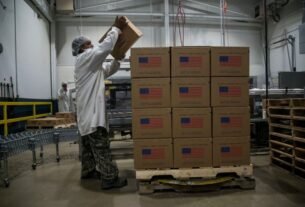While most of Europe was already off holidaying, the European Food Safety Authority quietly released its long-awaited scientific opinion on the welfare of mink, foxes, raccoon dogs and chinchillas kept for fur production.
This opinion, released on 30th July 2025, was requested by the European Commission to underpin its decision-making regarding the highly successful European Citizens’ initiative calling for a Fur Free Europe. The Commission’s objective was to consider whether it is possible to prevent or significantly reduce the welfare problems associated with fur farming.
Indeed, for decades there have been serious concerns about the severe suffering of animals on fur farms and the industry’s abject failure to alleviate their misery in any meaningful way.
The crux is that the fur farming industry hinges entirely on intensive production systems. Fur-bearing animals, who have highly complex species-specific welfare needs, are confined to small wire cages – side-by-side with their conspecifics – for the entirety of their short, miserable lives. These battery cages are so restrictive that the animals are unable to move around sufficiently or engage in natural behaviours, such as foraging and exploration. Animals often develop stereotypical behaviours, such as pacing, repeated circling, fur chewing or tail-biting, all indicative of a compromised mental state.
It was twenty-four years ago that the European Commission’s Scientific Committee on Animal Health and Animal Welfare sounded the alarm about the industry’s systemic failure to protect the welfare of species kept for fur production.
The Committee’s landmark report recommended that efforts be made to design housing systems that fulfil the animals’ needs, recognising that the welfare problems associated with fur farming would not be solvable by incremental improvements or welfare certification alone.
Together with increasing public opposition to fur farming, the findings of that report provided the impetus for European nations to start taking action to eliminate the industry. The UK and Austria took the lead with their national bans entering into force in 2003 and 2005 respectively. To date, 17 EU Member States have moved to prohibit fur farming altogether.
Nearly a quarter of a century on, the fur farming industry – much diminished by such legislative action – has failed to significantly re-design the intensive battery cage systems criticised in the 2001 report.
While it is always keen to trumpet its animal welfare commitments, the industry has done little more than design a voluntary welfare certification scheme around the existing inhumane housing systems. For the six million animals languishing in tiny barren cages on fur farms in Europe, this is not facilitating meaningful change, it is putting a band-aid on a broken leg.
It should come as no surprise that EFSA’s recent opinion is a damning indictment of the whole industry. The agency’s multi-national scientific panel critically concludes that confining mink, foxes, raccoon dogs and chinchillas to small barren wire cages is fundamentally incompatible with achieving an adequate level of animal welfare.
Most pointedly, EFSA states that the caged confinement systems currently in use would need to be replaced by enclosures, which are presently not in use in commercial fur production, to even stand a chance of affording the animals the space and stimulating environment they need to meet their basic behavioural needs.
What will the European Commission actually do with EFSA’s indisputable findings?
It is no secret that they are considering various policy options in regards to fur production. The first would involve a ban, after a transition period, on the farming of mink, foxes, raccoon dogs and/or chinchillas. The alternative is to “introduce legislation to set stricter and more specific harmonised standards to better address the welfare needs of fur animals.”
Given the strength of public sentiment against fur farming and EFSA’s unambiguous findings – not to mention the industry’s substantial negative impacts on the environment, biodiversity and public health – it would be absurd for the Commission to tie itself up in knots over new species-specific welfare requirements.
Unlike other branches of animal agriculture, such as poultry and pig production, in which various alternative higher-welfare production systems have been commercially implemented by producers, the fur farming industry has never chosen – or found it economically viable – to use any other kind of enclosure system for the commercial production of mink, foxes, raccoon dogs or chinchillas.
To be sure, there are a few countries like Germany and Switzerland that eliminated fur farming by adopting legislative welfare standards, such as more generous space requirements and providing swimming water for mink, which rendered fur production economically unviable.
Yet this is not what the 1,5+ million signatories of the Fur Free Europe ECI demanded and certainly not what many millions more EU citizens would support. They want to hasten the end of an already dying industry.
That is the central point here. Strict welfare standards, however unrealisable in practical or economic terms, would still give a veneer of legitimacy to the breeding of animals solely for their fur. It would suggest that keeping and killing species like mink and fox to supply the frivolous fashion trade with a luxury product – for which there are many warm, beautiful and humane alternatives already being used by innumerable brands and designers – is acceptable. It is not.
EFSA’s findings provide the Commission with a moral and empirical mandate to act. It would be senseless for policymakers to prevaricate about how much space and what enrichments a mink really needs – or to commission new research into alternative enclosure systems – when a far more straightforward and ethical solution is at hand, namely an EU-wide prohibition on fur farming.
The writing has long been on the wall for the fur farming industry. It is now up to the European Commission to relegate this cruel and unnecessary industry to the annals of history.
Dr Joanna Swabe is senior director of public affairs at Humane World for Animals Europe.





